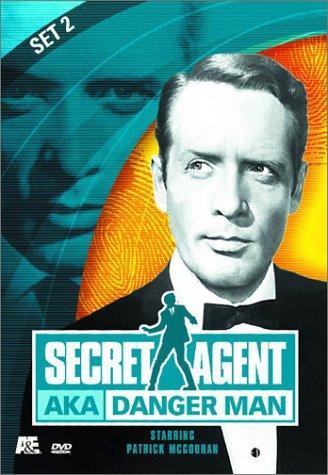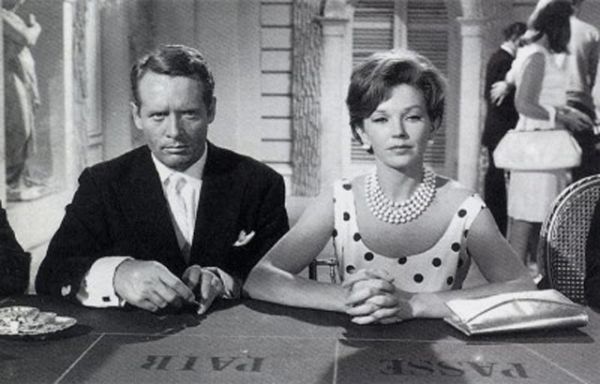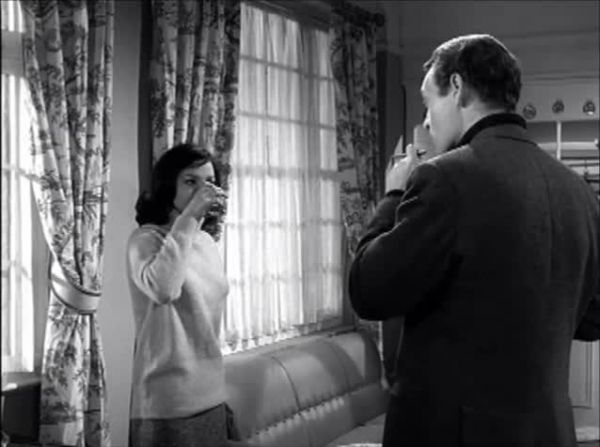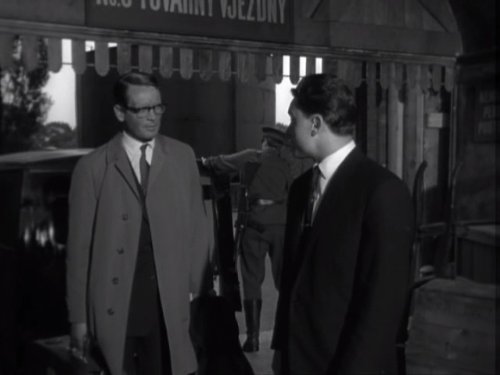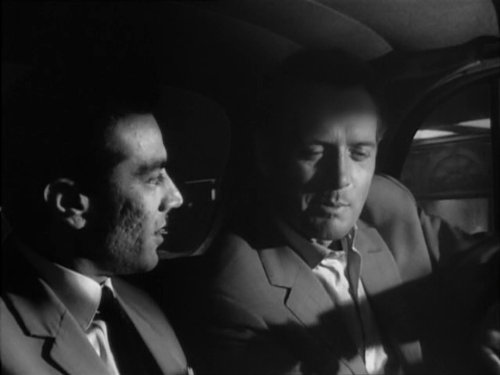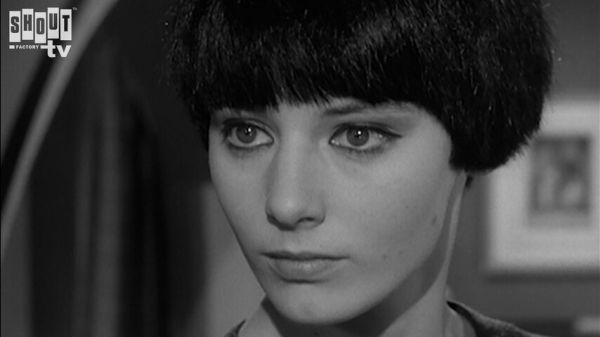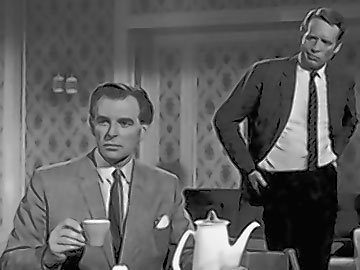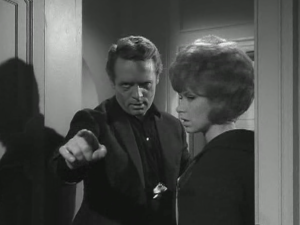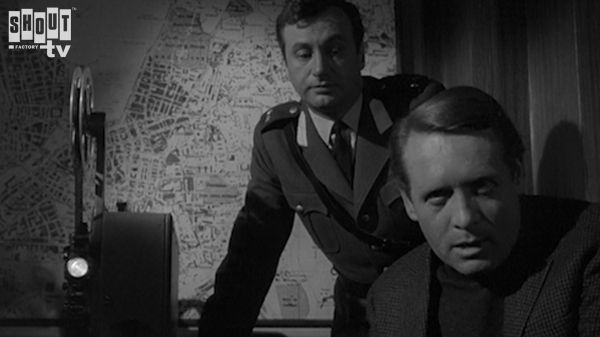Secret Agent John Drake
Remembering Secret Agent, John Drake
I bought the Secret Agent aka Danger Man "Mega-set" from Amazon ten years ago.
I did it after reading a line in Stephen King's novel The Shining. The novel concerns a six-year-old boy named Danny Torrance, whose Mom and Dad have taken a job as caretakers of a remote old hotel in the Rocky Mountains. Everyone should know the story by now. The hotel is haunted. Danny plays outside near the hedges, trimmed in the shape of animals, called a "topiary." In the corner of his eye, he can see the hedge animals silently moving toward him. They clutch at him, and it scares the wee-wee out of him, literally.
He had to get out of here. Concentrate on that. Be cool. Be like Secret Agent Man.
Would Patrick McGoohan be crying and peeing his his pants like a little baby?
From time to time, if I get bored or need encouragement, I watch episodes of Secret Agent. YouTube offers a few episodes for viewing. ShoutTV offers other episodes. The hour-long episodes are better than the half-hour. Wikipedia has informative articles about the development of the series, and on Patrick McGoohan and his relations with George Markstein and Lew Grade. Both Markstein and Grade were European Jews who emigrated to England to escape persecution. Markstein spoke German, Grade—real name Lev Winogradsky—spoke Yiddish and Russian. The combination of McGoohan's stage presence and the cosmopolitan viewpoint of the plot-material made the program a hit. During his time as Secret Agent John Drake, McGoohan pulled a larger salary than any other British actor.
But McGoohan held the program to quality-standards. When he felt the program did not match his expectations, he walked. The 30-minute format for Secret Agent didn't meet those standards, so he quit. Grade approached him and asked him to reprise his Secret Agent character John Drake in an hour-long format. McGoohan agreed. After three years of Secret Agent, the quality of the new Secret Agent material declined, so McGoohan quit again.
Grade came to him again, according to Wikipedia, and asked him if he had any other ideas. McGoohan said he wanted to film a program about a disillusioned secret agent who resigns from the agency that employs him. After an all-night conference, he and Grade shook hands to seal the deal, and production began for the new program—one of the most interesting of the 1960s, titled The Prisoner. Most people today see The Prisoner as a continuation of Secret Agent. The principals encouraged the rumor but never confirmed it.
The Beatles's George Harrison watched each episode of The Prisoner. No doubt, the other Beatles watched it with him. Harrison had important impressions about Patrick McGoohan and stated, "It was the first feeling I had ever had of being liberated from being a Beatle, or a number. It comes back to The Prisoner with Patrick McGoohan: 'I am not a number!' In our society we tend, in a subtle way, to number ourselves and each other, and the government does so, too.
"I remember we had Patrick McGoohan around, and he'd written a couple of episodes of a series called The Prisoner, which we liked very much. We thought, 'Well, maybe he could write something for us.'" McGoohan had enough personal clout, that people came to him.
In several episodes of Secret Agent, John Drake assumes the role of a bespectacled, clerical type—more comfortable behind an office desk, wearing glasses and wielding a typewriter instead of a firearm. The training for such roles came in handy when he took the role of the prison warden in Don Siegel's 1979 film Escape from Alcatraz, starring Clint Eastwood. His deadpan officiousness added a lot to it.
As John Drake, McGoohan also relished playing internal-security officers, not afraid to conduct peremptory interrogations of high-ranking government figures and their wives. His near-insolent high-handedness offended many of them. He could also bark with a sort of regimental bite. This came to the forefront of his acting abilities when he took the role of Edward III in Mel Gibson's movie Braveheart.
Favorite Episodes.
One of my favorites is the very first episode, broadcast for the first time in April, 1965, "The Battle of the Cameras," starring Niall MacGinnis and the lovely Dawn Addams. John Drake reveals yet another side to his complex character, his ability to act like a layabout, a person who does little work, and fancies himself cleverer than anyone else. He behaves vainly enough to irritate and attract other people at the same time, especially his female counterparts.
Dawn Addams plays "Martine," a Frenchwoman who works for Mr. Kent, (MacGinnis) a renegade Englishman working as an information-trafficker. He steals the proprietary information of government scientists, then sells it to the agents of other nations. Poor Martine usually does his dirty work for him.
Drake establishes his residence in an apartment on the French Riviera and spends his time surveilling Martine, while Martine's associates move into an appartment in a taller building next-door and surveille Drake. The flirty tone of the music gives the episode a comedic element that has to survive a burglary, a fistfight, and a scary climax.
The next favorite "Fair Exchange" appeared on TV just two weeks later in 1965, and stars Lelia Goldoni and Andre van Gyseghem. John Drake tries to help his old friend Lisa Lanzing who had helped him set up a network of agents in East Ge many; but East German spy-hunters captured her, and she endured hours of torture until her boss in London could negotiate her release.
Hysterical, Lisa tells Drake that someone is following her all over London and fears that her East German captors might kidnap her. Drake decides to tail Lisa and finds that a man is indeed following her. Drake confronts him but finds that he works for British Special Branch, a division of Scotland Yard. The Special Branch agent tells Drake that Lisa visits the shop of an Asian man who trafficks stolen passports. They wonder why on earth Lisa would want a stolen passport? Where could she go? East Germany?
The next episode, "The Mirror's New," appeared on the TV in June, 1965. It concerns an embassy official in Paris who goes missing for twenty-four hours. When he turns up again at the embassy, he cannot account for the missing time and does not appear to notice blood trickling behind his ear. He even denies that he went anywhere except to the embassy and then home again.
Drake plays a trick on the official by stealing a few pages from a report he needed to take to Germany, in order to make the official retrace his steps. Perhaps the official has another residence somewhere in Paris that neither his wife nor the people at the embassy knows about, and he will look for the missing pages there. Not only does Drake find the official's hideaway, he also uncovers the official's multi-tiered, secret life.
The next episode, "Colony Three," appeared the very next week in June, and ranks in my mind as one of the series' best. Drake's superiors keep an eye on the British Communist Party and discover that defections among low-ranking Party members are occuring at an alarming rate.
Drake's bosses can understand the Soviets might bribe or blackmail high-ranking government officials or scientists to leave, but why low-ranking Party members? Drake's boss arranges for him to "defect" by giving him the identity of a Party member. Drake has to find out where the defectors are going.
Drake flies to Prague. At the airport, hard-faced, uniformed officials put him in a van with blacked-out windows. They apparently drive him to Hungary and put him on a train, also with blacked-out windows. He wants to know where he is going, but the officials brusquely refuse to tell him. As he does in several episodes, Drake plays a low-ranking government clerk. On the train, he finds other British passengers—an electrician and a librarian. Although Party members, they have no more idea where they are going than Drake has.
"The Colonel's Daughter" is an important episode, inasmuch as it recalls Britain's role as a colonial power. Drake visits New Delhi in order to find a fugitive; but in the middle of the night, police raid his hotel room and drag him off to the office of the police superintendant, Khan. Khan treats Drake with friendly contempt, and tells him that the Delhi police are interested in a stay-behind Englishman who sells butterfly specimens.
"Flotsam of the British Raj!" Khan sneers.
Drake retorts, "Oh, you're not still chasing the poor old imperialists, are you?"
Khan explains that the Englishman seems to have a lot of money for a man who only sells butterflies. Khan offers to find Drake's fugitive, if Drake will, in turn, talk to the Englishman; but when Khan is murdered, Drake knows that he has more to worry about than just butterflies.
The next episode, "The Black Book," appeared on American TV in December, 1965. It is an interesting episode for the way it describes relations between the departments of the British government. Drake works in a fictional agency of the British Security Service, M9. However, his superiors feel free to loan him out to a British general who tells Drake that someone is blackmailing his brother-in-law, who works in the British Embassy in Paris.
Drake resents having to involve himself in the embassy official's personal affairs but takes the assignment. The embassy official claims not to know who is blackmailing him and refuses to tell Drake what the blackmailers have on him.
So Drake takes up the trail and finds that a pretty Frenchwoman, Simone, played by Georgina Harris, picks up the blackmail money. She leads Drake to a Russian named Sergei. Drake photographs Sergei without him knowing it. He shows the photo to his superiors and learns that Sergei has defected from the Soviet embassy and gone into business for himself with a black book full of incriminating information. The Soviet embassy sends its security thugs to find Sergei and retrieve the black book.
Drake follows Simone and finds out that the general's brother-in-law is not Sergei's only target. Sergei and Simone are blackmailing a dozen or more British officials throughout France, so that Drake is not simply helping the general, now. He is back on the beat for his agency, to find Sergei's black book before the thugs do.
I must also mention the soundtrack that accompanies this episode. It makes a stirring, wistful impression, mostly having to do with the pretty but insecure Simone finding a better life for herself, after Sergei.
"To Our Best Friend" appeared in February, 1966. Drake has an old friend who works for the British embassy in Iraq. He hears a rumor that his friend has become a Soviet double-agent. Drake travels to Bagdad to prove his friend's accusers wrong; but he has a problem. A British general with connections to Drake's agency has also heard the rumor. He believes it to be true and sends out a hit-team to take out the alleged double-agent himself. Drake has to prove the rumor false before the general's men can carry out his orders. Drake vents his anger against the general's hit-team, most of whom he knows already through his agency.
The episode has some unique insights—the rivalries that develop between agencies in the same government, which have responsibility for protecting the nation. It also expresses the human side of espionage and the complex relationships that develop, that endure—as in this instance—when an officer has to officially investigate an old friend.
How's this for Secret Agent humor:
Drake: "Well, Leslie, uh, now I have another reason for liking you: we're in the same business."
Leslie: "On opposite sides."
Drake: "On different teams."
"I Can Only Offer You Sherry" appeared on the TV in March, 1966. The episode is fairly important in the series because it describe the problem many Europeans face when they visit exotic places and find extraordinary poverty and human degradation. They stay in the nicest hotels and eat in the best restaurants, while the locals scrounge for whatever they can find. It has a pronounced effect on the wealthy Westerners.
They hear children continually crying; desperate beggars clamor for spare change; casual public violence goes on, meted out on inattentive passersby. The din of street-noise, the clamor of people fighting for survival, goes on all day. Police officers are routinely corrupt. The poor Europeans react to it all as clueless aliens, crippled by a just-get-me-outa-here anxiety. Criminal actions lead to medieval-grade punishment, such as stonings and amputations. Poverty and overpopulation enforced by religious authority cripple the nations' ability to advance.
Jean Smith, a British petroleum accountant, has relocated to Bagdad with her firm. The poverty, beggars, and crying children fill her with remorse and guilt. Soon, she meets a man named Ma'suud who tells Jean that he works as an activist for human rights in Iraq. She falls in love with Ma'suud, who is a stern moralist and hectors her into helping him. She hides his personal papers in her own safe. One evening, men who identify themselves as secret police break into her room, they find the incriminating papers, and threaten Jean and Ma'suud with prison time, if she does not do as they dictate. They blackmail Jean into giving them secret information about her employer's oil deposits. If she does not do as they asked, they will execute Ma'suud. Drake has to expose a complex, interesting conspiracy, and he has to make Jean a quarry in order to accomplish this.
Finally, I include the April, 1966, broadcast of "I'm Afraid You Have the Wrong Number" for its nuanced characters, its interesting story-line, and a few surprises for the viewer, along the way to its conclusion.
John Drake learns that a British spy-controller—code-named "Standfast"—has been captured by Soviet counter-espionage personnel attached to the Soviet embassy in Geneva, Switzerland. Drake has to contact each of Standfast's agents at the Russian embassy to warn them, and rescue Standfast before he talks. Drake also surmises that one of Standfast's agents betrayed him. Drake has to identify which one.
The Swiss police also give Drake a lot of trouble. They take his passport, so that he cannot leave the country. They begin to suspect he is a spy, not Standfast's attorney, as Drake claims to be. Captain Schulman of the Canton Police interrogates Drake to give up his real reason for visiting Geneva.
Standfast's agents are a motley group—dumpy, middle-aged Russian bureaucrats. Granite-faced proletarian heroes, they are not. The episode's curious title "I'm afraid you have the wrong number" refers to agent-code, meaning that the agent will meet Drake at the appointed time. If an agent cannot meet him, he will tell Drake, "This is not the number that you want." Drake is adamant about punctuality. If the agent is late, the reason may be that he has set a trap for Drake.
Conclusion
Secret Agent has high production values. The dialogue between characters has a level of literateness that transcends most television serials. The understated style of acting, typical of British actors of that era, conveys to the viewer a complexity of personality traits that make each character believable.
Each episode has a few nifty spy-gadgets, like a tape-recorder concealed inside an electric shaver, a camera inside a cigarette lighter, and a typewriter that both types pages and stores the data on spools hidden inside. The typewriter also has a camera lens on its front-side, allowing Drake, in his role as a government clerk to collect information on them without them knowing it.
Actor Patrick McGoohan insisted on believablity and litarateness, both for himself, as well for the series. Not surprisingly, after he quit Secret Agent and The Prisoner, he had plenty of work, right up to the end of his life.

